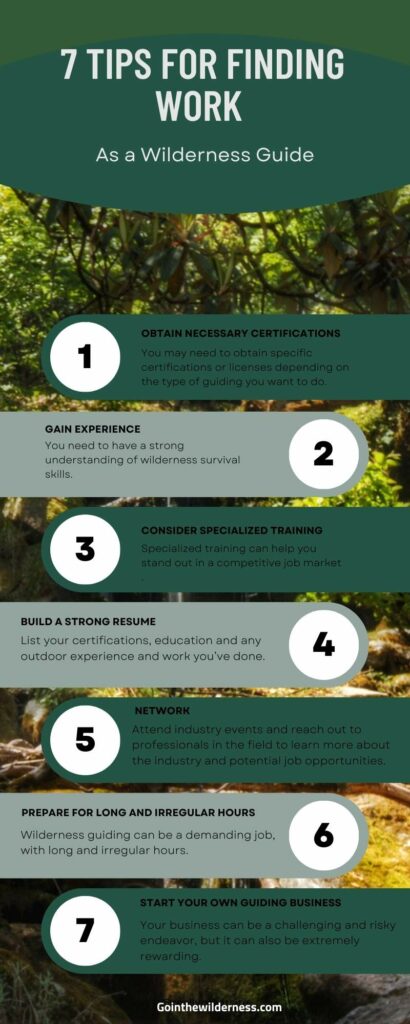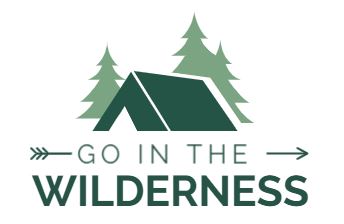Picture this: It’s Monday morning and you’re packing your bag for a week-long hike in a large national park. You’ll be enjoying breathtaking views, mesmerizing wildlife, and all-natural food. The best part of it all is that this is your job and you’ll be getting paid for it! Wilderness guiding is a rewarding career that lets you share your love of the outdoors with other people, leading them on exciting adventures in some of the world’s most beautiful and remote locations. If you’re considering a career as a wilderness guide, this article reveals some steps you can take to get started and succeed!
Top Tips for Finding Work as a Wilderness Guide
- Obtain necessary certifications: Depending on the type of guiding you want to do and the location you plan to work in, you may need to obtain specific certifications or licenses. For example, if you want to lead backpacking or rock climbing trips, you may need to be certified in wilderness first aid and have an up-to-date CPR certification. Other certifications you might need as a wilderness guide include: Leave No Trace training, Swiftwater Rescue training, and avalanche training. Many organizations—such as the National Outdoor Leadership School (NOLS) and the Wilderness Medicine Institute (WMI)—offer courses and training programs to help you gain the necessary qualifications and skills. Our tip: Figure out the type of wilderness guiding you’re interested in and seek out the corresponding qualifications!
- Gain experience: Experience is crucial for becoming a successful wilderness guide. You’ll need to have a strong understanding of wilderness survival skills, such as how to navigate using a map and compass, how to purify water, how to start a fire, and how to build a shelter. You should also be comfortable with a variety of outdoor activities, such as hiking, backpacking, rock climbing, and rafting. It will be especially useful if you know the terrain, environment, and local area like the back of your hand. That way you’ll be able to teach the accompanying group about the region, and you’ll have the right local knowledge to manage emergency situations when they arise. If you need more experience, our tip is to consider volunteering or interning with an outdoor education or guiding company to gain experience leading groups in the wilderness. You can also seek out opportunities to lead groups of friends or family on outdoor trips to build your leadership skills.
- Consider specialized training: Depending on the type of guiding you want to do; you may want to consider obtaining specialized training in a particular area. For example, if you want to lead rafting trips, you may want to become a certified rafting guide through the Professional Rafting Guide Association (PRGA). On top of that, if you want to be a rafting guide, it would be a good idea to get training as a lifeguard or an equivalent certification relating to water safety. Specialized training like this can help you stand out in a competitive job market and may also lead to higher paying job opportunities.
- Build a strong resume: A strong resume is essential for landing a job as a wilderness guide. In addition to listing your certifications and any relevant education, ensure your resume highlights your outdoor experience and any leadership roles you have held (be that in the outdoors sector or something else—leadership skills are transferable!). Make sure to highlight all the outdoors work you’ve done in your spare time, as it will show your passion and commitment to the practice. You may also want to include any outdoor-related awards or accolades you have received. What’s more, be sure to tailor your resume to the specific type of guiding you are interested in and consider including references from previous outdoor employers or clients.
- Network: Networking is an important aspect of any career, including wilderness guiding. Attend outdoor industry events and conferences and reach out to professionals in the field to learn more about the industry and potential job opportunities. Everybody has different experiences to share—and learning about them first-hand will give you the competitive edge. You can also join professional organizations such as the Association of Outdoor Recreation and Education (AORE) or the American Mountain Guides Association (AMGA) to connect with other guides and learn about industry trends and best practices.
- Be prepared for long and irregular hours: Wilderness guiding can be a demanding job, with long and irregular hours. You may be required to work weekends and vacation periods as this is when many families and 9-to-5ers have the most free time for hobbies and activities. This means that you might be away from home for extended periods of time. It is important to be prepared for this type of schedule and to have a strong support system in place to help you manage the demands of the job.
- Consider starting your own guiding business: If you have a strong passion for the outdoors and you have the skills and experience necessary to lead wilderness expeditions, you may want to consider starting your own guiding business. This can be a challenging and risky endeavor, but it can also be extremely rewarding. Before starting your own business, be sure to research the local market and competition and create a solid business plan. You’ll also need to consider liability insurance, gear and equipment rental, and doing marketing and promotion for your services.

Once you’re ready to make the leap, here are three websites where you can find professional wilderness guiding jobs: Backdoor Jobs, Outdoor Ed Jobs, and Occupation Wild.
Further Tips—and Skills You Should Have
So you now know some of the more practical aspects of preparing yourself for work as a wilderness guide and making your job applications stand out from the crowd. To round up our guide, here are some additional tips and skills you’ll need to hone on to succeed in your career in wilderness guiding.
- Start small: If you are just starting out as a wilderness guide, it can be helpful to start with small groups or shorter trips. This will give you the chance to gain experience and build your confidence before taking on more challenging or complex adventures.
- Be prepared: As a wilderness guide, you’re responsible for the safety and wellbeing of your clients. This means that you need to be prepared for any situation that may arise, whether it’s a medical emergency, a sudden change in weather, or an unexpected detour. Make sure you have the necessary equipment and knowledge to handle any situation that may come your way. Doing homework about the expedition you’ll be taking can make all the difference.
- Communicate effectively: One of the key skills of a successful wilderness guide is the ability to communicate effectively with clients, colleagues, and other professionals. This includes being able to clearly explain instructions, answer questions, and provide feedback in a calm, reassuring manner. Remember, this is a customer-facing job that requires strong customer service competencies.
- Be a positive role model: As a wilderness guide, you are a pillar of the outdoor community. You are not just leading people on outdoor adventures; you’re also setting an example for how to respect and appreciate the natural world. Be a positive role model by practicing Leave No Trace principles, respecting wildlife and natural resources, and encouraging your clients to do the same.
- Stay fit and healthy: Being a wilderness guide can be physically demanding, as you may be leading groups on long hikes while carrying heavy packs. It is important to stay in good physical shape so you can handle the physical challenges of the job. In your spare time, we advise playing a sport or visiting the gym so you’re not overwhelmed on expeditions.
- Keep learning: The wilderness is constantly changing and evolving, and as a wilderness guide, it is important to stay up-to-date on the latest techniques, trends, and regulations in the industry. Consider joining a professional organization, such as the Association of Wilderness Guides and Instructors (AWGI), which provides resources and opportunities for professional development.
To conclude, becoming a professional wilderness guide requires a combination of education, experience, and personal qualities such as leadership, communication, and problem-solving skills. With the right amount of dedication and hard work, you can turn your passion for the outdoors into a fulfilling and rewarding career as a wilderness guide!
I am Bruno. Navigating the urban rush by day, I find peace under the stars by night. Alongside my loyal companion and co-adventurer Lilith, we explore the balance between city life and nature’s embrace. Through writing and films, I delve into bushcraft and the wild’s allure.
GointheWilderness is my bridge between these two realms, guiding you to reconnect with your innate wilderness.
Eden is here and now; join us in rediscovering it.

